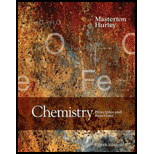
(a)
Interpretation:
The standard Gibbs free energy ΔG0 for the following reaction needs to be deduced at T = 25 °C
ZnS(s)→Zn(s) + S(s). From the calculated value of the free energy, the non-feasibility of the above reaction needs to be demonstrated.
Concept introduction:
- The change in the Gibbs free energy, ΔG is a
thermodynamic function which governs the spontaneity of achemical reaction . The negative value of ΔG represents that the reaction is spontaneous, whereas, the positive value represents that the reaction is non-spontaneous, and if ΔG = 0, then it represents that the reaction is at equilibrium. - The standard Gibbs free energy, ΔG0 is the value measured under standard conditions i.e. Pressure = 1 atm and Temperature = 25° C
- The standard Gibbs free energy ΔG0 is given in terms of the difference in the standard Gibbs Free energy of formation of the products and that of reactants.
ΔG0 = ∑npΔG0f(products) - ∑nrΔG0f(reactants) ------(1)
Where np and nr are the number of moles of the products and reactants.
(b)
Interpretation:
The standard Gibbs free energy ΔG0 for the overall reaction needs to be deduced from the following two contributing reactions. It needs to be demonstrated that the overall reaction is feasible at T = 25 °C.
ZnS(s)→Zn(s) + S(s)
S(s) + O2(g)→ SO2(g)
Concept introduction:
Free energy changes for reactions are additive. If a net reaction is a composite of two reactions with free energy represented as, ΔG1 and ΔG2 respectively, then the free energy change for the net reaction would be:
ΔG = ΔG1 + ΔG2 ------(2)
Want to see the full answer?
Check out a sample textbook solution
Chapter 16 Solutions
Chemistry: Principles and Reactions
- Which one? Ca2^- Na2^+ Si2^+ Mg2^- AI2^-arrow_forwardIn general, which is more polar, the stationary phase or the mobile phase? The stationary phase is always more polar The mobile phase is always more polar It depends on our choices for both stationary and mobile phase Their polarity doesn't really matter so we never consider itarrow_forwardPlease helparrow_forward
 Chemistry: Principles and PracticeChemistryISBN:9780534420123Author:Daniel L. Reger, Scott R. Goode, David W. Ball, Edward MercerPublisher:Cengage Learning
Chemistry: Principles and PracticeChemistryISBN:9780534420123Author:Daniel L. Reger, Scott R. Goode, David W. Ball, Edward MercerPublisher:Cengage Learning Chemistry & Chemical ReactivityChemistryISBN:9781337399074Author:John C. Kotz, Paul M. Treichel, John Townsend, David TreichelPublisher:Cengage Learning
Chemistry & Chemical ReactivityChemistryISBN:9781337399074Author:John C. Kotz, Paul M. Treichel, John Townsend, David TreichelPublisher:Cengage Learning Chemistry & Chemical ReactivityChemistryISBN:9781133949640Author:John C. Kotz, Paul M. Treichel, John Townsend, David TreichelPublisher:Cengage Learning
Chemistry & Chemical ReactivityChemistryISBN:9781133949640Author:John C. Kotz, Paul M. Treichel, John Townsend, David TreichelPublisher:Cengage Learning Principles of Modern ChemistryChemistryISBN:9781305079113Author:David W. Oxtoby, H. Pat Gillis, Laurie J. ButlerPublisher:Cengage Learning
Principles of Modern ChemistryChemistryISBN:9781305079113Author:David W. Oxtoby, H. Pat Gillis, Laurie J. ButlerPublisher:Cengage Learning ChemistryChemistryISBN:9781305957404Author:Steven S. Zumdahl, Susan A. Zumdahl, Donald J. DeCostePublisher:Cengage Learning
ChemistryChemistryISBN:9781305957404Author:Steven S. Zumdahl, Susan A. Zumdahl, Donald J. DeCostePublisher:Cengage Learning Chemistry: An Atoms First ApproachChemistryISBN:9781305079243Author:Steven S. Zumdahl, Susan A. ZumdahlPublisher:Cengage Learning
Chemistry: An Atoms First ApproachChemistryISBN:9781305079243Author:Steven S. Zumdahl, Susan A. ZumdahlPublisher:Cengage Learning





